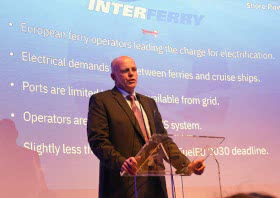
Access to shore power for ferries and
ships calling at ports is essential for the further
Development and implementation of sustainable ship propulsion
electric batteries and, ultimately, for the
decarbonisation of the maritime sector. This was underlined by the
representatives of shipping companies operating fleets of
speaking yesterday at the seminar entitled "Shore
Power offers promising carbon cuts - but are we on track?"
organized by Interferry, the international association that
represents these maritime carriers, in the context of the European
Shipping Summit taking place in Brussels.
In order to multiply the installation of transport systems in ports
Onshore Power Supply, which allow ships to connect to the
shore power grid and switch off the on-board engines, reducing the
emissions, the executives of ferry shipping companies
called for a significant increase in funding
essential to equip the port docks with these systems.
In addition, representatives of ferry carriers
have highlighted that current funding models often
Focus exclusively on Onshore Power Supply connection
at mooring, underestimating the importance for ferries to be able to
charge the on-board batteries needed to power the
electric propulsion during navigation, and have highlighted
the need for a change in strategy that includes
financing for the entire energy supply chain, from the power plant
to the port, including investments in the electricity grid
of the port and in the entire energy infrastructure.
"The
investments in OPS infrastructure - noted Johan Roos,
Director of Regulatory Affairs at Interferry - I am
fundamental for the energy transition of the activities of the
in Europe and around the world, supporting the adoption of
battery technology and reducing reliance on limited
alternative fuel resources. Focusing only on the ship
In the port, we lose sight of the big picture. We need
a significant supply of energy to charge the batteries on the
propulsion vessels, so that you can take full advantage of the
technological potential of OPS'. "The funds - he added
- must be allocated to modernize the entire infrastructure
and the Member States of the European Union can act as a
and become the reference point for development
global".
 "The ferry sector -
said Interferry CEO Mike Corrigan - represents a
driving force in the development of sustainable propulsion solutions for
the entire maritime transport sector, as we can see from the
large number of projects and investments made by our
member companies. Ground energy is a cornerstone
of our industry's decarbonisation efforts and we need to
ensure that funding supports the full range of needs
Infrastructure. We need a holistic approach to
achieve significant carbon reductions."
"The ferry sector -
said Interferry CEO Mike Corrigan - represents a
driving force in the development of sustainable propulsion solutions for
the entire maritime transport sector, as we can see from the
large number of projects and investments made by our
member companies. Ground energy is a cornerstone
of our industry's decarbonisation efforts and we need to
ensure that funding supports the full range of needs
Infrastructure. We need a holistic approach to
achieve significant carbon reductions."